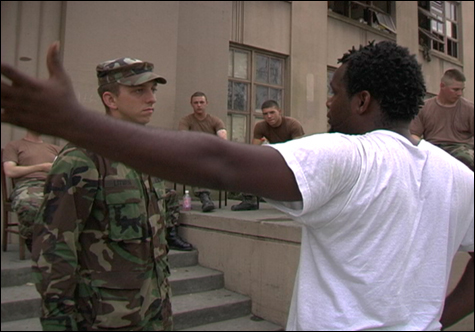
FACING OFF But authority always wins. |
It is impossible not to wonder how Louisiana might have fared after Hurricane Katrina, had Barack Obama been in office a term sooner. There are so many questions about what went wrong and how it could have been handled differently, which have gone unanswered for more than three years.
Kimberly Rivers Roberts, Carl Deal, and Tia Lessin try to answer some of them with their harrowing tale of reality in Trouble the Water. Equipped with her first camcorder, Roberts pressed "Record" and started gathering amateur, shaky, yet raw and brutally honest footage of her Lower Ninth Ward block the day before the hurricane made landfall, on August 29, 2005.
Roberts's video is combined with that of directors Deal and Lessin, producers of Fahrenheit 9/11 and Bowling for Columbine, to whom she offered her material at a Red Cross shelter a week after the storm, with the requirement to "keep it real." At times it is tough to hold on — there is an unsteady hand behind the camera, Louisiana drawl so thick it needs subtitles, violent winds that drown out voices, and blatant racism.
Knowing the brutal outcome, it's painful to see Roberts interviewing her neighbors — the young, the old, the drunken, and those without means, all displaying an unconvincing confidence in their decision to stay behind. Who among them lived to see the film — and who did not?
Roberts, her husband Scott, and her subjects are among those hardest hit by the storm and its aftermath: They are black, poor, stubbornly faithful native New Orleanians. From them we gain a street-level perspective before, during, and after the hurricane. Panic prevails as the rising water begins to submerge street signs and forces the Robertses and their anxious pets to the attic of their home. A fearful-looking Roberts says, "I'm running out of juice," before the screen goes black, leaving us to assume the camera battery has died.
The hurricane storyline aside, the Robertses' biographies themselves might have made for an interesting documentary. Kimberly, a 24-year-old rapper and self-described "street hustler," is the daughter of a drug-addicted mother who died of AIDS and sister to a prison inmate. Scott is a streetwise former drug dealer. The couple literally have the scars to show for their experiences: Scott bears a welt several inches long across his face, which Kimberly claims to have inflicted with a knife.
Surviving all this, and then being faced with a life-threatening natural catastrophe, would put anyone and any couple to the test. Yet Kimberly and Scott never leave each other's sides, as they trek to higher ground with the help of a family member, spend weeks on end at a shelter, stay briefly at a relative's home, and temporarily relocate to Memphis. Whether the directors chose to exclude the footage or it just never happened, the Robertses never lose patience with each other.
Kimberly is a pillar of selfless strength, consistently putting others' needs before her own, never weakening under the pressure of the circumstances — not even when she finds her uncle's decomposing body after two weeks in his home (the National Guard hadn't managed to check his house yet).